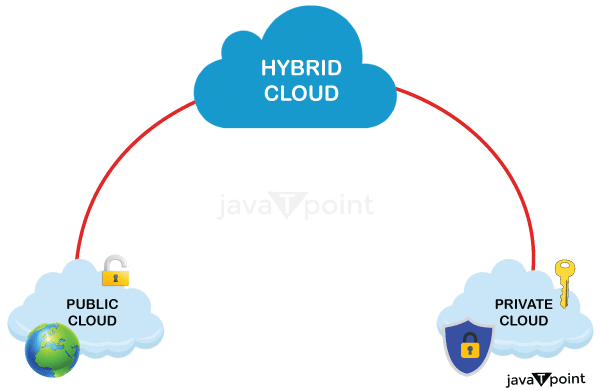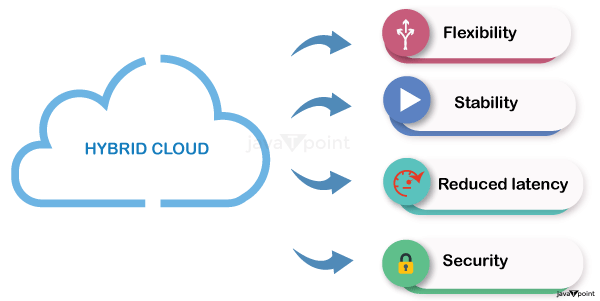What is Hybrid Cloud?
A computer system known as a hybrid cloud involves the usage of both public and private cloud services. Utilizing the advantages of both kinds of clouds enables organizations to meet their own demands and wants.

A private cloud infrastructure, which is devoted to a single organization and gives additional control, security, and flexibility, is used to host some applications, data, or workloads in a hybrid cloud configuration. Other workloads, data, or applications may also be hosted concurrently in a public cloud environment. This environment is shared by many users and provides scalability, cost-effectiveness, and flexibility.
- The main aim of combining these clouds (Public and Private) is to create a unified, automated, and well-managed computing environment.
- In the Hybrid cloud, non-critical activitiesare performed by the public cloud, and critical activities are performed by the private cloud.
- Mainly, a hybrid cloud is used in finance, healthcare, and Universities.
- The best hybrid cloud provider companies are Amazon, Microsoft, Google, Cisco, and NetApp.
Characteristics of Hybrid Cloud:
- Integration: Hybrid cloud enables businesses to combine their current on-premises infrastructure seamlessly with public cloud environments.
- Flexibility: Hybrid cloud gives organizations better control over their infrastructure by allowing them to use the public cloud for non-critical tasks and the private cloud for sensitive applications.
- Savings(Cost): Organisations can benefit from the public cloud's cost reductions while still preserving control over their sensitive data and apps by using hybrid clouds.
- Scalability: With a hybrid cloud, resources may be scaled up or down as needed without the need for extra on-premises infrastructure investments.
- Security: By retaining sensitive data and apps in a private cloud environment and utilizing the security features offered by public cloud providers, the hybrid cloud enables organizations to maintain a high level of protection for these assets.
- Data Mobility: The hybrid cloud gives organizations more flexibility and agility by making it simple to move data between public and private cloud environments. Disaster Recovery: By utilizing a hybrid cloud, businesses may create a disaster recovery plan that incorporates both public and private cloud environments, increasing their resilience and redundancy.

In general, a hybrid cloud gives businesses a chance to profit from both public and private cloud systems while also addressing some of their respective drawbacks.
Private and Public Cloud Environments Integration:
A crucial component of hybrid cloud computing is the integration of public and private cloud systems. Organizations can use hybrid clouds to combine the advantages of both public and private clouds while yet ensuring seamless integration between the two setups.
Integration Can be Accomplished using a Number of Methods, including:
- Virtual Private Network (VPN): VPNs allow data to be transported between public and private cloud environments while maintaining a secure and encrypted connection.
- Hybrid Cloud Management Platforms: These tools let you manage both private and public clouds from a single interface. They give administrators a unified picture of the complete infrastructure, enabling them to manage resources, track performance, and impose regulations across the two environments.
- Apps can connect with cloud environments through "Application Programming Interfaces (APIs)"; this enables the development of hybrid apps that use both public and private clouds.
- Containerization: Applications can now be packaged using containers to make them portable between many environments, including public and private clouds.
- Cloud bursting: Based on demand, cloud bursting enables smooth application scaling across public and private clouds. Control over their sensitive data and applications in a private cloud environment enables organizations to benefit from the elasticity of public cloud environments.
Overall, the success of hybrid cloud computing depends on the integration of public and private cloud systems. It enables businesses to benefit from both environments while yet maintaining control over their critical information and applications.
Advantages of Hybrid Cloud
- Flexibility: Organisations have access to a lot of flexibility because of hybrid clouds. While keeping mission-critical data and applications on-premises or in a private cloud environment, they can take advantage of the scalability and cost-effectiveness of the public cloud for non-critical workloads.
- Cost Reduction: Businesses can reduce their IT spending by utilizing the public cloud's cost advantages for less-important tasks while storing their more crucial and sensitive data and apps in a private cloud environment.
- Security: Organisations may profit from the advantages of public cloud environments while still maintaining control over their sensitive data and apps thanks to hybrid cloud technology.
- Flexibility: Organisations may be more flexible and responsive to changing business needs using hybrid cloud technology. While maintaining the security of sensitive data and applications in a private cloud environment, they can quickly deploy new applications or workloads in the public cloud.
- Performance Improvement: By enabling organizations to use the resources of both public and private cloud environments, the hybrid cloud can help them perform better.
- Risk Management: Hybrid cloud provides an excellent way for companies to manage risk.
Disadvantages of Using Hybrid Cloud:
- Complexity: Managing hybrid cloud environments can be challenging, particularly when combining several cloud environments, networking, and security.
- Security: Hybrid clouds can provide additional security difficulties, such as managing identities across several environments and securing data as it is being transferred across clouds, even though they improve security for critical data and applications.
- Challenges with Integration: Integrating several cloud environments can be difficult, particularly when integrating data and applications.
- Data Sovereignty: When using public cloud environments, organizations must be aware of data sovereignty standards, especially if they are using sensitive data that is governed by data residency rules.
- Vendor Lock-In: When employing hybrid cloud systems, organizations need to take care to prevent vendor lock-in. To ensure mobility and prevent vendor lock-in, they should pick cloud providers that offer open standards and APIs.
- Infrastructure Compatibility: Infrastructure compatibility is the major issue in a hybrid cloud. With dual levels of infrastructure, a private cloud controls the company, and a public cloud does not, so there is a possibility that they are running in separate stacks.
- Reliability: The reliability of the services depends on cloud service providers.
|


 For Videos Join Our Youtube Channel: Join Now
For Videos Join Our Youtube Channel: Join Now










